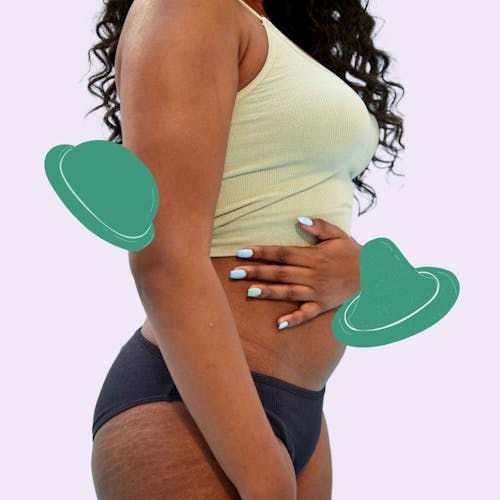This website uses cookies to enhance the user experience. By using Yoppie you are agreeing to our use of cookies.
Navigating Birth Control When You're Trans Or Non-Binary
What are the best birth control options for me?
Does hormone therapy protect against pregnancy?
What if I just don’t want a period?
Will birth control affect my hormone therapy?
What if I’m not taking hormones?
Can birth control be used in place of hormone therapy?
Does hormone therapy affect fertility?
There is unfortunately a lack of information out there when it comes to birth control options for trans and non-binary people. If you have questions about which option is right for your body, whether you are taking hormones or not, it can feel overwhelming. While it’s always best to visit your doctor to discuss your options in detail, we’re answering the most common questions on the topic of hormones, birth control and fertility. Let’s take a look...
What are the best birth control options for me?
There are tons of birth control options out there, including pills, IUDs, implants, injections, rings, and condoms (internal and external). In any case, it’s always best to discuss your contraception options with a healthcare professional who can advise based on your personal medical history. Regardless of your gender identity, there may be some methods of contraception that are not safe to use due to underlying health conditions.
You’ll find general information on birth control here, but this paper published in 2017 by the Faculty of Sexual and Reproductive Healthcare at the Royal College of Obstetricians and Gynaecologists has a list of specific birth control options for trans and non-binary people which may be helpful - read it here.
Does hormone therapy protect against pregnancy?
There is a common misconception that trans and non-binary people cannot become pregnant when taking hormone therapy, and therefore no longer need birth control.
It would seem that while research has been done on fertility preservation for trans individuals, there is a lack of information around pregnancy prevention and the contraceptive needs of trans and nonbinary people who were assigned female at birth. In fact, existing research shows many people falsely believe that because their hormone therapy makes them amenorrheic (stops their period) this means they cannot become pregnant. This is not the case, as the process of ovulation can still occur when amenorrheic.
Hormone therapy can affect fertility, but it does not protect trans men and non-binary people from pregnancy. Similarly, for trans and non-binary people who were assigned male at birth, taking oestrogen does not prevent the development of sperm in the testicles, so there could still be a risk of pregnancy. It’s also worth noting that in both cases, hormone therapy can decrease fertility but it should not be relied upon as a form of contraception.
What if I just don’t want a period?
You may be interested in birth control for reasons other than preventing pregnancy. For those who menstruate and don't identify as female, having a monthly period can bring up issues with gender dysphoria. Gender dysphoria is when an individual feels a sense of unease due to a mismatch with their gender identity. For those who have a uterus but do not identify as female, they may feel more comfortable suppressing their menstruation to minimise those feelings. This can be done using various forms of birth control such as the progestogen-only pill, implant, injection or hormonal coil.
It can sometimes take a trial of a few different types of birth control to find the one that works for your body and that will effectively suppress your period. It is best to discuss this with your doctor so they know your goal and can advise on the best options.
Will birth control affect my hormone therapy?
If you are trans or non-binary and taking hormone therapy, you may be wondering how your choice of birth control will affect this, if at all. Similarly, some worry that taking birth control that includes oestrogen will make their body look more feminine or mess with their testosterone. This is rarely the case, however if you are concerned by this, there are non-hormonal and oestrogen-free birth control options available.
In many cases, hormonal birth control and hormone therapy can be used together, but there is still a chance that birth control may affect hormone therapy, so let your doctor know if you are taking both so they can be aware of dosage requirements and help you decide the best option.
What if I’m not taking hormones?
If you are trans or non-binary and you are not undergoing hormone therapy, you may still be at risk of pregnancy. If any person has sex where there is a potential for egg and sperm to meet, pregnancy can occur. If pregnancy prevention is your goal, you may want to speak to your doctor about contraception options to avoid this.
Can birth control be used in place of hormone therapy?
Hormone therapy can be a complex process requiring special care and supervision from a healthcare professional. Although some types of birth control contain oestrogen, it is not a suitable replacement for hormone therapy, and will not have the same effects as the oestrogen found in birth control pills, as this is a different form and dose than what would typically be prescribed for hormone therapy. Also, birth control pills do not contain the anti-androgens that work to block the effects of testosterone on the body.
Does hormone therapy affect fertility?
Yes, hormone therapy can affect long-term fertility. Studies have shown that although some people who stop taking hormone therapy can become fertile again around 3-6 months after stopping, others may not regain fertility. The effects of hormone therapy on fertility are potentially reversible, but more research needs to be done in this area, as the long-term effects are not known. For this reason, discussing fertility preservation options with your doctor can be helpful. Of course, if long-term fertility isn't a concern, there are surgical forms of permanent birth control; lots of trans men will undergo a hysterectomy and many trans women often undergo orchidectomy to help reduce dysmorphic feelings.
Want to know more about this topic or share your experiences? Drop a note into our private Facebook group or say hello on Insta @itsyoppie. Don't forget that our personalised period subscription box can get organic tampons, pads, liners (and more!) delivered easily and regularly through your letterbox, which is one less thing to worry about, wherever you're at.
Fact checked by Doctor Samantha Miller.
Section jump
Back to top
Subscribe To Our Newsletter
YOPPIE





© 2026 Yoppie is a registered trademark of Phlo Technologies Ltd.
Yoppie's supplements are not a substitute for a varied diet and healthy lifestyle and are not intended to diagnose, treat, or cure any disease. If you are pregnant, breastfeeding, have a medical condition or are under medical supervision, please consult with your doctor before taking any of our products.






